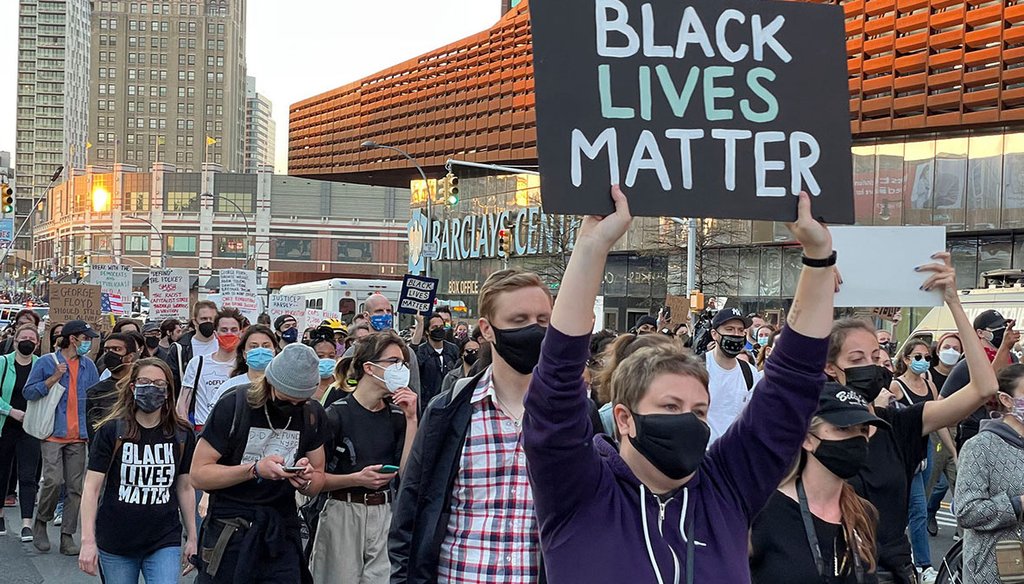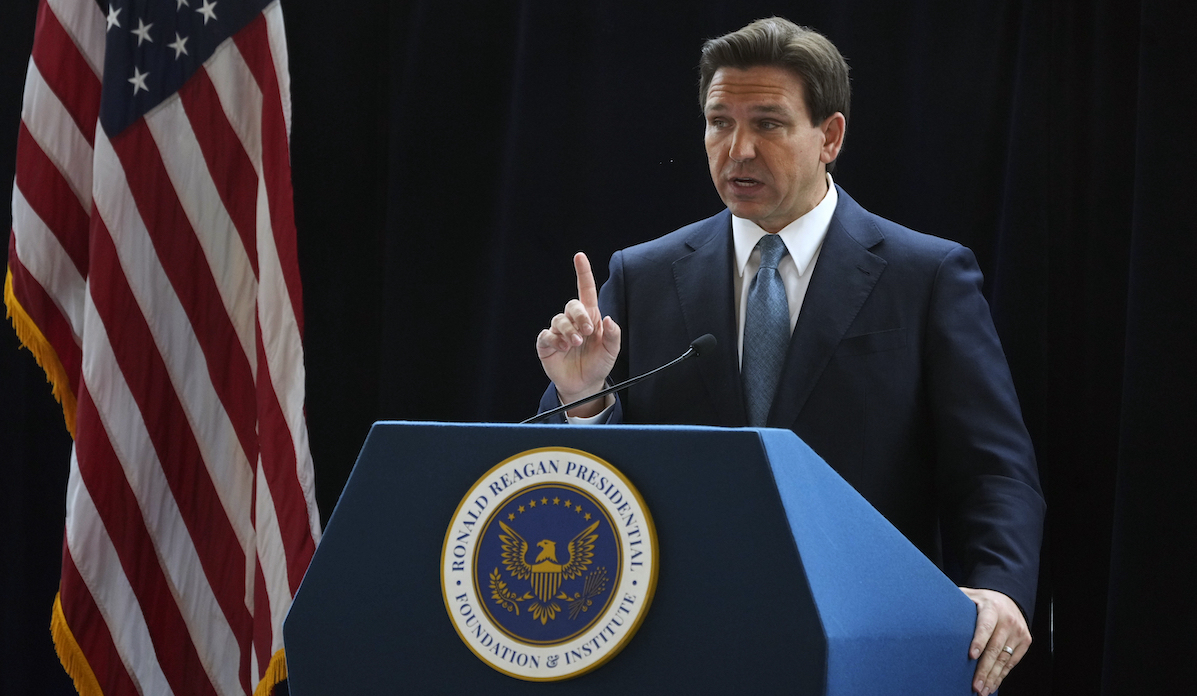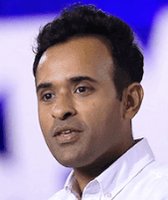Stand up for the facts!
Our only agenda is to publish the truth so you can be an informed participant in democracy.
We need your help.
I would like to contribute

Demonstrators march in Brooklyn, N.Y., after former Minneapolis police officer Derek Chauvin was found guilty of murdering George Floyd. “Woke” was a label some social justice activists adopted during the Black Lives Matter and Me Too Movements. (AP)
If Your Time is short
-
“Woke” began in Black vernacular as a warning to be wary of racism.
-
It was adopted by liberal social justice advocates during the Black Lives Matter and Me Too movements in 2020. But conservatives have co-opted the term and used it as an all purpose condemnation of the left.
-
Because definitions of “woke” vary, polling on the term becomes dicey, polling experts say.
Are you woke to "woke"? Seems pundits and politicians can’t stop talking about it.
Arkansas Gov. Sarah Huckabee Sanders’ Republican response to President Joe Biden’s State of the Union address warned of "woke mobs." Former South Carolina Gov. Nikki Haley, in announcing her GOP presidential candidacy for 2024, promised a country that wasn’t "weak and woke." And Rep. Jim Banks, R-Ind., started an "anti-woke caucus" in the House.
Florida Gov. Ron DeSantis made anti-"wokeness" a rallying cry for his 2022 reelection campaign in Florida, often saying, "This is where woke goes to die." DeSantis even signed a "woke" law — the Stop the Wrongs to Our Kids and Employees (Stop WOKE) Act, which would outlaw classroom teaching in Florida that would cause students to "feel guilt, anguish or any form of psychological distress" because of their race, color, sex or national origin. A federal judge blocked it in November.
Biden, who has faced conservative flak for denouncing "MAGA Republicans," can’t escape "woke," even if he’s not in the room. At a Feb. 14 White House press conference, James Rosen, a reporter from the right-leaning broadcaster Newsmax, asked press secretary Karine Jean-Pierre whether the president was "woke." Jean-Pierre deflected the question.
Just what is "woke," anyway? Definitions seem to vary by speaker, and that makes it hard to understand how people really feel about it, polling experts say.
CBS’ Margaret Brennan and NBC’s Chuck Todd both asked guests to define "woke" on their Feb. 12 television shows. Definition seekers have also wanted answers; on Feb. 16, they’d pushed "woke" to the top of Merriam-Webster’s most searched terms list. (The dictionary’s website, m-w.com, defines "woke" as "aware of and actively attentive to important societal facts and issues (especially issues of racial and social justice).")
Many sources trace "woke" to Black vernacular. In 1923, Jamaican political activist Marcus Garvey wrote, "Wake up, Ethiopia! Wake up, Africa!," to call the Black diaspora to social activism.
The blues singer Huddie Ledbetter, aka Lead Belly, used the term in his 1938 song "Scottsboro Boys," as a warning to Black people to stay wary of racism.
Perhaps prophetically, William Melvin Kelley in 1962 highlighted "woke" in a New York Times essay about white people appropriating Black slang terms and mangling their meanings.
"Woke" seems to have lost its place as a Black community signal. In February, University of California, Berkeley law professor Khiara M. Bridges, who is Black, wrote, "Slang amongst Black people is a love language. ... There’s something really sinister about this term not only being taken from us but also deployed against us. It’s a double violation."
And "woke" has gone beyond racial social justice to also apply to LGBTQ rights and feminist causes.
British lexicographer and linguist Tony Thorne said he construes "woke" to mean "alert to and aware of issues of social justice." Since the 2000s, he told PolitiFact, it’s meant something like "an activist for or militant supporter of equality, diversity, social justice."
Thorne said liberals once might have called themselves "woke" to affirm their devotion to social justice during the Black Lives Matter and Me Too movements. However, he said, conservatives have reshaped "woke" into an all-purpose condemnation for their opponents, often meaning something like "self-righteous leftist." In this sense, Thorne said, "woke" joins "politically correct," "cancel culture" and "metropolitan liberal elite" as terms conservatives use against opponents.
"If you use a term like this, it functions as a trigger word or 'dog whistle,' in that as soon as you say it you no longer need to say anything else," Thorne said. "The word will be accepted by your base, rejected by your opponents and no further discussion will take place."
Here’s what PolitiFact learned after months of watching "woke" in the wild.
Political definitions for "woke" are all over the place.
In December 2022, Mother Jones magazine got DeSantis to define woke through a spokesperson. The answer: "‘Slang term for activism … progressive activism’ and a general belief in systemic injustices in the country." In November, when asked under oath what "woke" meant during a court case, Ryan Newman, DeSantis’ general counsel said, "Generally, the belief there are systemic injustices in American society and the need to address them." And in his newly released book, "The Courage to Be Free," DeSantis himself added a third definition: "What constitutes ‘woke’ is open to debate, but for the left, a fundamental attribute of wokeness is the subordination of facts and evidence to anecdote and ideology."
Indiana’s Banks, who recently announced a run for Senate, defined "woke" nebulously. In January, he called for a recorded vote in the House on "an amendment to defund ‘wokeness’" on any bill that spends money on "leftist activities." So far, there’s been neither an introduction of nor a vote on such an amendment.
Sen. Tommy Tuberville, R-Ala., didn’t define woke any more clearly March 2 during the Conservative Political Action Conference. Though his discussion was called "Sacking the Woke Playbook," he mentioned the term just once amid descriptions of liberal stances on transgender athletes, school curriculum and church-state separation. "All this ‘woke,’" he said.
John Feehery, a Republican strategist who served as press secretary for former House Speaker Dennis Hastert, told PolitiFact that "woke" started on the left and the GOP rebukes it reasonably.
"The woke were people who understood that America is a systematically racist place and also understood that capitalism is inherently unjust and unfair," he said. "The Republicans who condemn the woke believe the opposite. They believe that America is inherently a great place and that socialism is inherently evil. These are the battle lines. It’s a good fight to have."
Florida Gov. Ron DeSantis speaks March 5, 2023, at the Ronald Reagan Presidential Library in Simi Valley, Calif. When he ran for reelection as Florida’s governor in 2022, DeSantis often said his state was where "woke goes to die." (AP)
Polls show "woke" was hot before the November midterm elections and still sizzles.
-
"Woke" and crime: A 64% majority of 2,010 voters answered yes when a Harvard CAPS Harris poll asked, "Do you think that the increase in crime is the fault of woke politicians with or other factors? "(By party, that was 52% of Democrats and 75% of Republicans.) The poll also asked how important "is stopping the teaching of woke ideologies in schools" and found that 48% answered it was very important and 29% said it was somewhat important. The poll, conducted in October 2022, didn’t define "woke."
-
"Woke" and business: A 56% majority of voters from a national Morning Consult poll of 2,006 registered voters answered "no, definitely not," when asked if they thought politicians should punish companies "that speak out against discrimination." On the question of whether politicians should punish companies "for withdrawing financial support from members of Congress who voted against certifying the 2020 presidential election results," 46% of polled midterm voters said "no, definitely not."
The poll, backed by the tech industry-oriented, left-leaning Chamber of Progress, ran in November 2022 and didn’t mention "woke" specifically. -
"Woke" and education: Fifteen percent of voters said it’s among their top three goals to "make sure schools don’t teach a ‘woke’ political agenda" in a national Hart Research poll commissioned by the left-leaning American Federation of Teachers. Twenty-seven percent of 1,502 registered voters polled in December 2022 said they agreed with the statement, "The teachers in our public schools often go too far in promoting a ‘woke’ political agenda in the classroom." In contrast, 65% agreed with the statement, "The teachers in our public schools generally stick to teaching appropriate academic content and skills." The poll’s methodology showed a roughly even Democratic-Republican split for participants.
Polling experts who were not involved in the polls we cited noted multiple problems with the efforts by pollsters to ask questions about "woke."
-
"Woke" is ill defined. Margie Omero, a Democratic pollster and principal at GBAO, a Washington, D.C., research company, said "woke" raises an important polling conundrum: If there’s no shared understanding of what a word means, can you still test it?
"Despite Republican efforts to make the word a rallying cry, voters in the (American Teachers Federation-Hart Research) poll clearly say ("woke" is) not a top-tier concern — either because of unfamiliarity with the word or because of a rejection of the divisiveness its use now represents," Omero said.
-
The questions imply false connections. Justin Gross, a University of Massachusetts, Amherst political science professor, said the Harvard CAPS Harris poll, for example, implies a plausible causal connection between "woke politicians" and crime, which pushes respondents more toward answering that "yes," higher crime and "wokeness" are linked.
-
The questions lead the witness. Tatishe Nteta, a provost professor of political science at the University of Massachusetts, Amherst, and Gross’ colleague, said including "woke" primes poll respondents to apply their own views of the term and the groups associated with it (progressives and people of color) rather than objectively assessing the "woke" policies or candidates.
-
The questions make false assumptions. Gross said the Harvard CAPS Harris poll’s question about whether "stopping the teaching of woke ideologies in schools" is an important issue assumes that "woke ideologies" are being taught in schools.
"Even if I don’t know what it means, it clearly doesn’t sound like something I should be happy about," Gross said. "Try this question and see what happens: ‘How concerned are you about the euthanizing of puppies and kittens for dissection in high school biology classes?’"
Janine A. Parry, a University of Arkansas political science professor who directs the 24-year-old Arkansas Poll, said polling provocative "culture war"-type constructs such as "woke" struck her as simultaneously irresistible and silly. When concepts such as "woke" are trending, she said, it’s natural for pollsters, political actors, news organizations and others to want to gauge their broad level of support.
"(But) the reason they’re trending is because — despite being conceptually squishy — loud swaths of the electorate have staked out hyperbolic positions on them," Parry said. "So, when we poll them, we’re really just measuring support for a progressive versus a conservative worldview, not support for any particular policy."
RELATED: What is a MAGA Republican?
Our Sources
The New York Times, Earning the "woke" badge, April 19, 2016
The American Conservative, The true purpose of the term "woke," May 16, 2017
"Penn State University. In "Stay Woke," Penn State faculty member examines racism and anti-racism, June 17, 2020
FiveThirtyEight: Why attacking "cancel culture" and "woke" people is becoming the GOP’s new political strategy, March 17, 2021
The Hill, Poll: One-third of voters identify as "woke," June 16, 2021
Palm Beach Post, What does it mean to be "woke," and why does Florida Governor Ron DeSantis want to stop it?, April 14, 2022
The Washington Post, What we really mean when we say "woke," "elites" and other politically fraught terms, Sept. 19, 2022
National Review, Poll: 64 percent of Americans blame "woke politicians" for crime spike, Oct. 16, 2022
Harvard-HarrisX poll, Oct. 12-Oct. 13, 2022
The Washington Post, "Woke" is a political term with a long and complicated history, Dec. 31, 2022
Morning Consult poll, Midterm voters’ technology priorities, polling presentation, January 2023
Axios, Focus groups: Florida swing voters confused by "woke," Jan. 12, 2023
The Week, Sarah Huckabee Sanders’ SOTU response was important not for what it said but what it didn't, Feb. 8, 2023
The Hill, Most voters don’t want GOP to punish "woke" companies: poll" Jan. 16, 2023
Time, Why "woke" is a convenient Republican dog whistle, Jan. 26, 2023
Politico, What’s Really in the AP African-American Studies Class DeSantis Rejected?, Jan. 31, 2023
The New Yorker, What is "woke," Jan 27, 2023
NPR, Critics say Florida aims to rewrite history by rejecting African American studies, Jan. 27, 2023
Refinery 29, When did "woke" lose its meaning and how do we get it back?, Feb. 1, 2023
Education Week, Map: Where critical race theory is under attack, Feb. 3, 2023
The College Board, Our commitment to AP African American Studies, the scholars, and the field, Feb. 11, 2023
YouTube, WATCH: Newsmax reporter grills Karine Jean-Pierre: 'Is President Biden woke?,' Feb. 12, 2022
Mother Jones, Here are the things Ron DeSantis thinks are "woke," Feb. 12, 2023
MSNBC, Maddow blog: Why a House Republican created an "anti-woke caucus," Feb. 14, 2023
Merriam-Webster, woke definition, accessed Feb. 16, 2023
Tampa Bay Times, In face of DeSantis anti-woke rhetoric, Black leaders go back to ’60s, Feb. 18, 2023
Hart Research Associates December 2022, American Federation of Teachers national education survey, accessed Feb. 20, 2023
Legal Defense Fund, How woke went from "Black" to "bad," accessed Feb. 21, 2023
The Washington Post, Republicans use "wokeism" to attack left — but struggle to define it, Feb. 21, 2023
Conservative Political Action Conference, Sen. Tommy Tuberville, R-Ala., March 2, 2023
Excerpt, "The Courage to Be Free," by Ron DeSantis, accessed March 2, 2023
Email interview, Tony Thorne, British linguist and lexicographer, Feb. 18, 2023
Email interview, Janine A. Parry, University of Arkansas political science professor and director, Diane D. Blair Center's Arkansas Poll, Feb. 22, 2023
Email interview, Tatishe Nteta, provost professor of political science, University of Massachusetts, Amherst, Feb. 22, 2023
Email interview, Justin Gross, political science professor, University of Massachusetts, Amherst, Feb. 22, 2023
Email interview, John Feehery, partner, EFB Advocacy, Feb. 22, 2023
Email interview, Margie Omero, Democratic pollster and principal at GBAO, Feb. 20, 2023





































